(完整版)【人教版】九年级英语课文单词知识点精讲第九单元ppt
人教版九年级英语unit9全单元课件
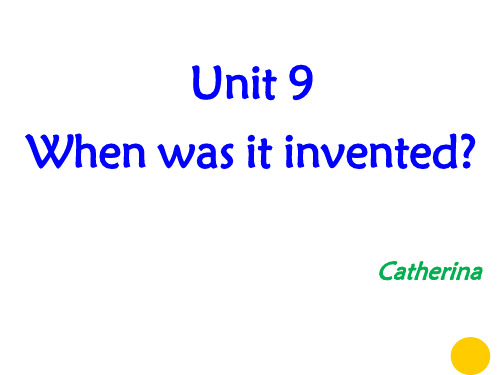
10.The abacus was invented in the sixth century by the Chinese. (P73) in the sixth century意为“在6世纪”,其中century作名 词,意为“世纪,百年”。 in the + 序数词 + century表示“在某世纪”。 e.g. I think advertising was higly developed in the twentieth century.
adj. 脆的;易碎的 adj. 咸的;含盐的 adj. 酸的; 酸味的 错误地 n. 厨师 v. 撒(粉末状物); 洒(液体)
Great Inventions
light bulb
[bʌlb]
personal computer
microwave oven
[maikrəweiv] [ʌvən]
calculator
Words and expressions
notice v. 注意到;察觉到 produce v. 生产;制造;产生 pleasant adj. 合意的;令人愉快的; 讨人喜欢的 mixture n. 混合;混合物;混合剂 in this way 这样 pie n. 馅饼 flying disk 飞碟;飞盘 bakery n. 面包店 Bridgeport 布里奇波特 Connecticut (美国) 康涅狄格州 throw v. 投;掷
◆notice sb. do sth. 表示“注意某人干了 某事”,强调动作的过程 。 Did you notice him repair his car yesterday evening? 昨晚你注意到他修车了吗? ◆notice sb. doing sth. 表示“注意到某人 正在干某事”,强调动作正在发生。 I noticed her singing in the next room. 我注意到她正在隔壁唱歌。 ◆notice + that从句 I noticed that you weren’t among the contestants. 我注意到你没有参加比赛。
人教版英语九年级上册-第九单元ppt课件
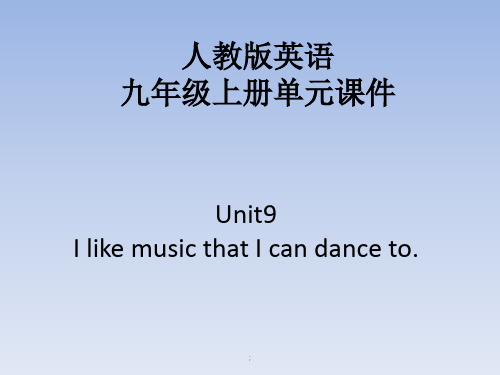
;
单项选择
1. I like music ___B____ great lyrics.
A. that have
B. that has
C. who have
D. who has
2. They are talking about things and persons ____C___ they saw there a few days ago. A. who B. which C. that D. what
I can remember well the persons and some pictures that I saw in the room. e. 以who或which引导的特殊疑问句, 为防止 反复, 只能用that。例如:
Who is the girl that is crying? f. 主句是there be 构造, 修饰主语的定语从 句用that, 而不用which。例如:
;
关系词引导定语从句, 指代先行词, 并在 从句中作一定成分, 如作主语、宾语或 状语等。 用来引导定语从句的关系代词有that, which, who, whom, whose。 本单元我们重点讲解that, who和which 引导的定语从句。
;
◆that引导的定语从句 that引导定语从句时, 既可以指人, 也可以 指物, 在从句中可以作主语或宾语。
7. I’m studying a subject _th__a_t _/ _w_h_i_c_h_ I am very interested in.
8. The girl with __w__h_o_m__ I went shopping yesterday is my cousin.
人教版九年级英语上册Unit 9 Grammar Focus(课件ppt)
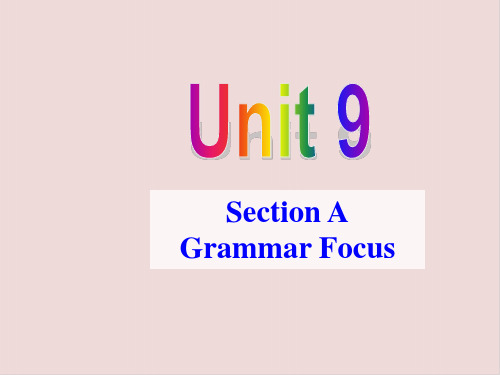
Translate the phrases.
stick to
遵守;坚持
depend on
随……而定
be down
心情低落
cheer sb. up
使某人提起精神;使某
人振奋
have a happy ending 有个美满的结局
try one’s best 尽某人全力;竭尽全能
Do you know the girl who / that is singing in the classroom?
This is the biggest fish (that) I have ever seen.
Guess quickly
It is the astronaut who … ➢ is a lady. ➢ is a pilot. ➢ is China’s first female
astronaut.
It is the singer who … ➢ is a girl. ➢ is from Hong Kong. ➢ makes face with a fish
mouth.
Guess quickly
Guess quickly
It is the basketball player who …
2. Generally, old people like music _t_h_a_t _/_w_hich is quiet and gentle.
3. The girl th__a_t _/ _w_h_o__/_w_h_o_m__ you met just now in the street is my friend.
shut off one’s brain 大脑不想事情
人教版英语九年级全册Unit9复习课件

e.g. He went to see them once in a while. 他偶尔去探望他们。
12.I sensed a strong sadness and pain. 1) sense v. 感觉到, 意识到
3.marry娶;嫁;结婚;和...结婚 marry sb. / get married 表示动作 例. He married a pretty girl. She married a soldier. =She got married to a soldier. They got married last year.
人有五种感觉:视觉,听觉,嗅觉,味觉和 触觉。
2) sadness n. 悲哀
e.g. Don't give yourself up to sadness, there's still hope! 不要太悲伤,还有希望!
ness是个名词后缀,一些形容词后加ness可变成名词,如:
happy—happiness kind--kindness sad adj. 悲伤的,忧愁的 e.g. She sang a sad song. 她唱着悲伤的歌。 3) pain n. 疼痛,努力
e.g. It is unnecessary to look up every word you don’t know in the dictionary while
your are reading. 阅读时,碰到生词,不必都要在词典中查阅。 I looked up and saw him. 我抬起头来看见了他。
【人教版】九年级英语课文单词知识点精讲第九单元ppt
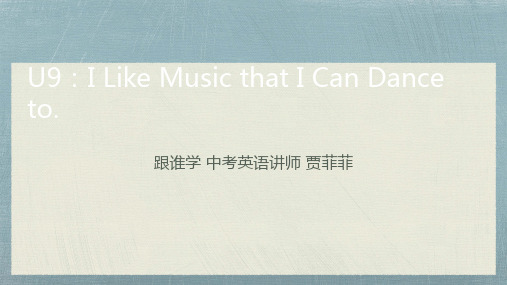
lifetime n. 一生;有生之年 He won a lot of prizes in his lifetime.
pity n. 遗憾;怜悯 It's a pity that most of us die too soon.
director n. 导演;部门负责人 He is the director of the show.
case n. 情况;实情 It’s a classic case of bad planning.
in that case 既然那样;假使那样的话 —I’ve made up my mind.—In that case, there’s no point discussing it.
I have a friend (who/whom/that) everybody likes.
The basketball (which/that) my uncle gave me is great.
end of this weekend. in the end 最终 In the end, the prince married the princess.
语法
定语从句 定语修饰名词,定语从句放在名词之后。 前置定语:a cute dog 后置定语:a dog called Lucky 定语从句:I have a dog which is called Lucky.
sadness n. 悲伤;悲痛 I felt a deep sadness.
pain n. 痛苦;苦恼 She was clearly in a lot of pain.
人教版九年级英语unit9第九单元全单元课件

纪录片
❖ drama
戏,剧
❖ plenty o f
大量许多
❖ shut off
关闭
❖ superhero
超级英雄
❖ once in a while
偶尔
❖ intelligent
聪明的
❖ in time 及时 on time 按时
❖ 1 stick to doing sth 坚持做某事
❖ 2 cheer up
ut Dan Dervish
4. I prefer groups 3. I like musicians
that play quiet and slow songs
who write their own songs.
Carmen 2. I love elctronic 1. I like musicians
√
√
1c
Pairwork
A: What kind of music do you like ? B: I like music that I can sing along
with. What about you? A: I prefer music that has great
lyrics.
2a
4. My parents live in a house_w_h__ic_h_/_t_h_a_t
is more than 100 years old.
6. Kevin is reading a book _w__h_ic_h_/_th__a_t
is too difficult for him.
7. Is there anything __t_h_a_t___ you want
英语人教版九年级全册Unit 9 Grammar Focus ppt
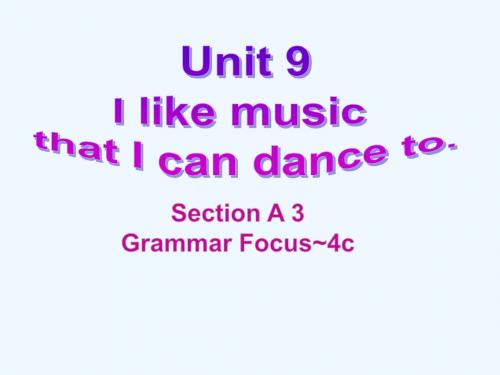
先行词是 teachers ,
关系词是___t_h_a_t_/w__h_o____
指代 人 (人?/物?),
在定语从句中作___主___语
I have a friend that/who is very funny.
先行词是 friend 关系词是__th__a_t_/w__h_o
,
指代____人____(人?/物?),
She likes musicians who play different kinds of music.
Attributive Clause
定语从句
定语从句是修饰 名词 或 代词 的一种 从句,被修饰的词叫做先行词 。定语 从句通常放在先行词的 后面 ,引导定 语从句的词叫做 关系词 。
that, which, who…
love
food that/which... clothes ... that/which...
Grammar Focus
What kind of music do I love music that/which I can
you like?
sing along with.
What kind of groups does Xu Fei like?
Let’s find out !
Examples
Rules
He prefers groups that/which play quiet and slow songs.
先行词是 groups ,
关系词是_t_h_a_t/_w_h__ic_h_____ 指代 物 (人?/物?),
在定语从句中作___主___语
An elephant
D
人教九年级U9重点单词和短语.ppt
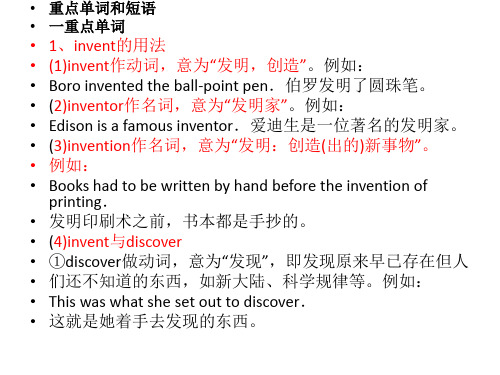
物逗留在一定的场所或保持原来的形状或状态。 • (2)stay“逗留”,只表示人逗留在一定的场所。 • (3)Stop“逗留”,原意为“停止”,俗语中与stay同义。
• • • • • • • • • • • • • • • • • • • • • •
二 重点短语 1、be used for be used for意思为“被用来做……”,表示用途或目的,for为介词,后加名词或 动名词。即be used for sth/doing sth.=be used to do sth.例如: They are used for energy of the machines. 它们被用来作这些机器的能源。 It is used for cleaning the classroom. 它是用来打扫教室的。 =It is used to clean the classroom. 由use组成的其他相关词组: (1)be used to(doing) sth.习惯于(做)…… 例如: She is used to opening the window in the morning. 早晨她习惯打开窗户。 (2)be used as把……用作……as在此是介词“作为”的意思。例如: The room is used as a reading room. 这个房间用作阅览室。 (3)used to do sth.“过去常常做某事”,意思为现在已不做这件事。例如: 1 used to be short.我过去是矮的。 They used to play on the road.他们过去常在公路上玩。 (4)use…to do sth。意为“用…做”。to do sth.表示目的。例如: We use the machine to do some exercise. 我们用这个机器锻炼身体。
人教版九年级英语unit9知识点讲解

人教版九年级英语unit9知识点讲解Unit 9: Have you ever been to a museum?In the ninth grade English curriculum of the People's Education Press, Unit 9 focuses on vocabulary, grammar, and speaking skills related to the topic of visiting museums. This unit encourages students to expand their knowledge and cultural understanding by introducing them to various types of museums and artwork. In this article, we will delve deeper into the key points covered in this unit.1. Vocabulary:Unit 9 introduces students to a plethora of new vocabulary related to museums, art, and culture. The acquired vocabulary enables students to express their ideas and opinions more accurately. For example, they learn words like "exhibition," "masterpiece," "sculpture," and "portrait." These words provide students with a solid foundation for discussing different forms of artwork and their significance.2. Grammar:In this unit, students are introduced to the past perfect tense. The past perfect tense is used when describing an action that happened before another action in the past. For instance, "By the time we arrived at the museum, the exhibition had already ended." This grammatical concept allows students to structure their sentences more accurately and convey a sense of time sequence.3. Speaking Skills:Unit 9 also focuses on developing students' speaking skills, particularly in the context of discussing personal experiences. By asking questions such as "Have you ever been to an art gallery?" or "What exhibitions have you visited recently?", students are encouraged to share their personal encounters with art and culture. This not only enhances their speaking abilities but also fosters cross-cultural understanding among classmates.4. Types of Museums:The unit goes beyond the basic concept of museums and explores a variety of specialized museums. Students learn about art galleries, science museums, history museums, and natural history museums. This exploration broadens their horizons and exposes them to diverse fieldsof knowledge. Additionally, it encourages students to appreciate different forms of art and fosters a sense of curiosity about the world around them.5. Masterpieces and Artists:Unit 9 introduces students to renowned artists and their masterpieces. By studying famous paintings, sculptures, and other works of art, students can develop a deeper appreciation for the creativity and skills of these artists. This knowledge also helps students understand the historical and cultural significance of these artworks. Exploring masterpieces such as Leonardo da Vinci's "Mona Lisa" or Vincent van Gogh's "Starry Night" allows students to engage in discussions about art, aesthetics, and cultural heritage.6. Cultural Understanding:Through the study of Unit 9, students are encouraged to appreciate different cultures and their unique artistic contributions. They learn about traditional art forms from various countries, fostering a sense of respect and admiration for different cultural traditions. This promotes a more inclusive and tolerant mindset among students, fostering a positive classroom environment.In conclusion, Unit 9 of the ninth grade English curriculum provides students with an opportunity to explore the world of museums, art, and culture. By expanding their vocabulary, understanding grammar, and developing their speaking skills, students can communicate more effectively and engage in meaningful discussions about art. Furthermore, this unit promotes cultural understanding and appreciation, fostering a sense of global citizenship among students.。
九年级人教版英语unit9全课件

When was it invented?
被动语态构成 一般现在时 am / is / are +done 一般过去时 was / were +done 一般将来时 shall / will + be +done 过去将来时 would / should + be +done 现在进行时 am / is / are + being +done 过去进行时 was / were + being+done 现在完成时 have / has + been+done 过去完成时 had + been +done
用动词的被动语态填空
Was 1.____ a new library built ______ ( build ) in our school last year ?
2.Cotton __________ ( grow) in the southeast of China. is grown 3. How many trees ____ ____________(plant) yesterday?
What would you do if you were alone on a tiny 微小的 island?
A: I’d like to have some matches
because I could light a fire点火 to
keep warm. B: Yes, but that’s not going to help you leave the island. I think it would be better to have a call phone.
Unit 9(单元解读课件)九年级英语全一册(人教版)

2.1b以听的形式输入目 suppose,
标语言,学生通过听 smooth,spare,
进一步熟悉以that引导 director,
的定语从句,了解不 case,war
同音乐的特点表述,
3.1c结对操练,运用
that引导的定语从句口
头表达。
4.2a-2d的听说任务链
对人物的表述更加完
整,交际语言更丰富。
喜好的动词:like,
love,prefer,旨在
通过各种句型的对
比练习,学会不同
的表达方法。
核心句型
that/which/ who引导的定 语从句
技能与策略 学习要点
1.能运用that/which/ who引导的定语从 句描述事物或人物, 使事物特点具体化, 人物特点更明确, 句意表达更完整。 2.能灵活运用
发展需求
正确使用有关音乐和 电影的相关词汇,识 别理解并简单运用 that, which, who 引导的定语从句,以 听说读看写等方式理 解和表达自己与他人 的喜好;能够根据篇 章的主旨大意找出相 关的细节信息,提高 综合语言运用能力;
发展途径
创造有趣的教学情 景和设计难易适宜 的任务,让全班学 生都能参与到活动 中来,创造更多的 机会说英语,通过 小组合作学习降低 学习难度,让他们 体验成功的喜悦。
ever heard,
be born in
1.学会利用 上下文语境 找出相关细 节信息。 2.要求学生 在理解阅读 材料的基础 上尝试用所 学语言实现 口头输出。
课时内容解读 第六课时Section B 3a-self check 课例展示
单元主题:人与社会(文学、艺术与体育)
教材
语篇 形式
人教版九年级全册英语课件:Unit 9 Grammar Focus(共12张PPT)
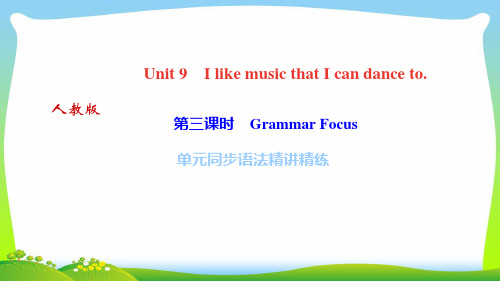
• 17、儿童是中心,教育的措施便围绕他们而组织起来。2021/7/202021/7/202021/7/202021/7/20
• 2、Our destiny offers not only the cup of despair, but the chalice of opportunity. (Richard Nixon, American President )命运给予我们的不是失望之酒,而是机会之杯。二〇二一年六月十七日2021年6月17日星期四 • 3、Patience is bitter, but its fruit is sweet. (Jean Jacques Rousseau , French thinker)忍耐是痛苦的,但它的果实是甜蜜的。10:516.17.202110:516.17.202110:5110:51:196.17.202110:516.17.2021 • 4、All that you do, do with your might; things done by halves are never done right. ----R.H. Stoddard, American poet做一切事都应尽力而为,半途而废永远不行6.17.20216.17.202110:5110:5110:51:1910:51:19 • 5、You have to believe in yourself. That's the secret of success. ----Charles Chaplin人必须相信自己,这是成功的秘诀。-Thursday, June 17, 2021June 21Thursday, June 17, 20216/17/2021
•
9、要学生做的事,教职员躬亲共做; 要学生 学的知 识,教 职员躬 亲共学 ;要学 生守的 规则, 教职员 躬亲共 守。2021/7/202021/7/20Tuesda过去最杰出的人谈话。2021/7/202021/7/202021/7/207/20/2021 11:02:59 PM
Unit9 SectionA词汇精讲课件2021-2022学年人教版九年级英语

Australian
adj.澳大利亚(人)的 n. 澳大利亚人
1.他是一个澳大利亚人. He is __a_n_A_u_s_t_ra_l_ia_n__. 2.我有一些澳大利亚朋友. I have some __A_u_s_t_ra_l_ia_n__ friends. 3.Mary来自澳大利亚. Mary comes from __A_u_s_t_ra_l_ia__..
Destiny制作
读音 词性 含义
用法 举例
人教版九年级
01 02 03 04 05
Unit 1 Section A , Section B
Unit 2 Section A , Section n B
Unit 4 Section A , Section B
prefer vt.更喜欢
注意: 现在分词 preferring 过去式 preferred 过去分词 preferred
prefer vt.更喜欢
prefer sth to sth
比起某物更喜欢某物
prefer doing sth to doing sth 比起做某事更喜欢做某事
prefer doing sth
I/We suppose that...
注意: 否定前移
我/我们认为...
I/We don't suppose that... 我/我们认为...不...
suppose sb (to be) +n/adj.
认为某人...
Practice makes perfect.
1.我认为你可以和他一起去. I __su_p_p_o_s_e__ you can go with him. 2.我认为Helen今晚不会去看电影. D13e5s4ti0n0yI1工6_9作6_d0室_o出_n品_'t_s_u_p_p_o_s_e_ Helen __w_i_ll_g_o__ to the movie tonight. 3.我认为他是一个澳大利亚人,不是吗? I suppose he is an Australian,__i_sn_'_t _h_e__? 4.我认为这位女士是一名医生. I __s_u_p_p_o_s_e__ the woman __(_to__b_e_)__ a doctor.
新人教版九年级英语unit9单词讲解.ppt

2. lyrics n. 歌词 I prefer music that has great lyrics.
3. Australian n. 澳大利亚人 adj. 澳大利亚(人)的
他是一位澳大利亚的男孩。
He is an Australian boy.
4. electronic adj. 电子的,电子设备的 electricity n. 电,电能 电子音乐
18. superhero n. 超级英雄 superheroes
19. once in a while 偶尔地,间或 Байду номын сангаас义词 = sometimes = from time to time = now and then
▪ intelligent adj.有才智的,聪明的
▪
同义词
▪
= wise
▪
= clever
12. down adj. 悲哀,沮丧 be down / feel down eg. I feel down about the trouble. let …down 使…失望 I won’t let you down. 同义词 sad
13. dialog = dialogue n. 对话,对白 同义词 conversation Can you hear the dialog? make a dialog
我更喜欢咖啡
I prefer coffee.
比起糖果,我更喜欢水果
I prefer fruits to candies.
prefer doing sth 更喜欢做某事 prefer to do sth 宁愿做某事,
强调特定情况或具体动 作I prefer walking.
人教版英语九年级上册-第九单元ppt课件
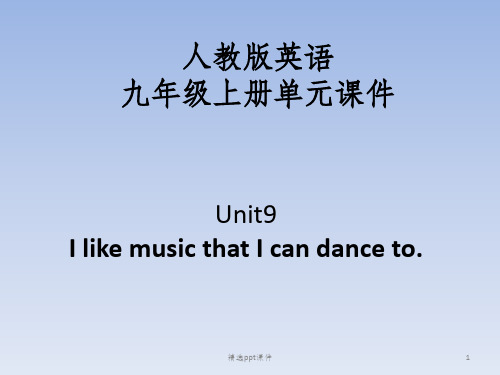
Is there anything that you want to buy in the shop?
c. 先行词被the only, the very, the same, the last, little, few 等词修饰时,只能用that,而 不用which。例如:
This is the same bike that I lost.
精选ppt课件
2
Section A Grammar Focus
2021/7/11
精选ppt课件
3
What kind of music do you like? I like music that I can sing along with. Rosa likes music that’s quiet and slow. I love singers who write their own music. We prefer music that has great lyrics.
the city mall is made of silk. 4. Bill likes music _t_h_a_t_/_w_h_i_c_h_ he can
sing along with.
精选ppt课件
25
5. This is the village _th_a_t_/_w__h_i_ch_ I used to live in.
6. Women always like buying many things __th_a_t__/ _w_h_i_c_h__ they don’t need at all.
7. I’m studying a subject _th__a_t _/ _w_h_i_c_h_ I am very interested in.
- 1、下载文档前请自行甄别文档内容的完整性,平台不提供额外的编辑、内容补充、找答案等附加服务。
- 2、"仅部分预览"的文档,不可在线预览部分如存在完整性等问题,可反馈申请退款(可完整预览的文档不适用该条件!)。
- 3、如文档侵犯您的权益,请联系客服反馈,我们会尽快为您处理(人工客服工作时间:9:00-18:30)。
war n. 战争;战争状态 How many people died in the war? stick v. 粘贴;将……刺入 He stuck a stamp on the envelope. stick to 坚持;坚守 She finds it hard to stick to a diet. down adj. 悲哀;沮丧 I feel a bit down today. dialog n.(dialogue)对话;对白 I can remember the dialogs in the movie. ending n. (故事、电影等的)结尾;结局 Every story has an ending.
director n. 导演;部门负责人 He is the director of the show.
case n. 情况;实情 It’s a classic case of bad planning.
in that case 既然那样;假使那样的话 —I’ve made up my mind.—In that case, there’s no point discussing it.
sense v. 感觉到;意识到 n. 感觉;意识 I have a poor sense of direction.
sadness n. 悲伤;悲痛 I felt a deep sadness.
pain n. 痛苦;苦恼 She was clearly in a lot of pain.
reflect v. 反映;映出 Their actions clearly reflect their thoughts. moving adj. 动人的;令人感动的 His performance was very moving. perform v. 表演;执行 Our team performed very well in the yesterday's games. lifetime n. 一生;有生之年 He won a lot of prizes in his lifetime. pity n. 遗憾;怜悯 It's a pity that most of us die too soon. total n. 总数;合计 adj. 总的;全体的 in total 总共;合计 There's only about 150 people in total.
documentary n. 纪录片 I don’ t like documentaries. drama n. 戏;剧 I watched a costume drama yesterday. plenty of 大量;充足 You have plenty of time to read. shut v. 关闭;关上 When they leave, I shut my office door. shut off 关闭;停止运转 He shut off the car alarm. superhero n. 超级英雄 Superheroes always save the world.
master n. 能手;主人 v. 掌握 Every man is the master of his own fortune. praise v. & n. 表扬;赞扬 We cannot praise him too much. recall v. 回忆起;回想起 She could not recall his name wound n. 伤;伤口;创伤 The wound healed quickly. painful adj. 令人痛苦的;令人疼痛的 Is your back still painful?
suppose v. 推断;料想 I was supposed to call my mother an hour ago.
smooth adj. 平滑的;悦耳的 The water is as smooth as glass.
spare adj. 空闲的;不用的 v. 抽出;留出 How do you spend your spare time?
in the end 最终 In the end, the prince married the princess.
定语从句 定语修饰名词,定语从句放在名词之后。 前置定语:a cute dog 后置定语:a dog called Lucky 定语从句:I have a dog which is called Lucky.
U9:I Like Music that I Can Dance to.
跟谁 v. 更喜欢 Which one would you prefer, tea or coffee?
lyrics n. (pl.) 歌词 These lyrics and melodies never go out of style.
Australian adj. 澳大利亚的;澳大利亚(人)的 n. 澳大利亚人 The gentleman speaks English with an Australian accent.
electronic adj. 电子的;电子设备的 Electronic computers are now in common use all over the world.
once in a while 偶尔地;间或 I’ve only met him once in a while.
intelligent adj. 有才智的;聪明的 The boy was so intelligent that he graduated from college when he was only ten years old.
by the end of 在……之前 He had learnt a lot by the end of last week.
at the end of在(时间/地点)的末端 There's a shop at the end of the street. I finished my work at the end of this weekend.
try to do sth. 努力做某事 try doing sth. 尝试做 try one’s best to do sth. 尽全力做某事 I tried my best to help my brother study English. try on 试穿 try out 试验 I tried on the best clothes. I want to try out this method.
prefer 更喜欢 prefer sth. (to sth. )更喜欢……(与……相比) I prefer coffee to juice. prefer to do sth. (rather than do sth.) 宁愿做某事(相比于做某事) I preferred to stay at home rather than go out.
关系代词: 连接词代替被修饰名词(sb./sth.),作从句中的成分 (宾语可省略)。 代替人:who/whom(宾格)/that 代替物:which/that 代替所属关系:whose I have a friend who likes English. I have some friends who like English. I have a friend (who/whom/that) everybody likes. The basketball (which/that) my uncle gave me is great. I know a girl whose father is a worker.
